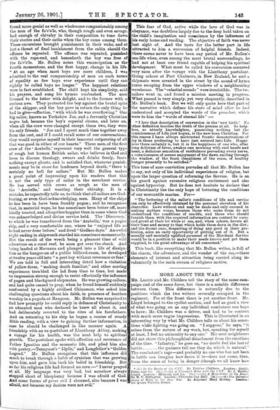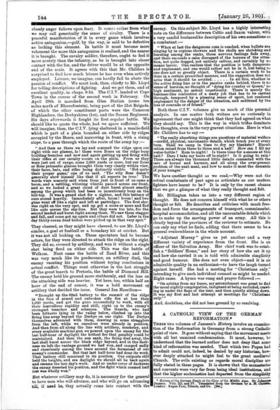MORE ABOUT THE WAR.*
Mn. LLOYD and Mr. Childers tell the story of the same cam- paign and of the same force, but there is a notable difference between them. This difference is naturally due to the positions which the two- writers severally occupied in the regiment. For at the front there is yet another front. Mr. Lloyd belonged to the cyclist section, and had as good a view of what was going.. on as any individual combatant can hope
to have; Mr Childers was a driver, and had to be content with much more vague impressions. This is illustrated in an interesting way by what Mr. Childers tells us about his sensa- tions while fighting was going on. "I suppose," he says, "it arises from the nature of my work, but, speaking for myself at least, I feel no animosity to any one." His next neighbours did not share this philosophical detachment from the emotions of the time. "Infantry," he goes on, "no doubt feel the lust of
battle the gunners tell me they do, which is natural." The combatant's rage—and probably no one who has not been in battle can imagine how fierce it is—does not come, then, from the sense of being in danger (though we all know how • (1.) In the Ranks of the C3.3'. By Eraldne Childers. London i Elder, and Co. f0s.]—(2.) A Thousand Miles tcith the C.I.V. By J. Barclay Lloyd. London : Methuen and Co. [4.3--(3.) A Mule-driver at the Prost. By B. C. Bffiington. London: Chapman and Hall. _pa.] — (4.) The Salvation Army at Work In the Boer War. By Adjutant Mazy Murray. London: 101 queen Victoria Street.
closely anger follows upon fear). It comes rather from what we may call generically the sense of rivalry. There is a peaceful manifestation of it in every game which involves active antagonism,—golf, by the way, is said to be defective as lacking this element. In battle it must become more vehement the more this antagonism is realised, and the nearer it is brought. The cavalry soldier, therefore, ought to feel it more acutely than the infantry, as he is brought into closer contact with the foe, and the driver would be at the opposite end of the scale. It agrees with this that Mr. Childers is surprised to find how much leisure he has even when actively employed. Leisure, we imagine, can hardly fail to abate the passion of conflict. We must look, then, chiefly to Mr. Lloyd for telling descriptions of fighting. And we get them, and of excellent quality, in chaps. 9-14. The C.I.V. landed at Cape Town in the course of the second week in February. On April 29th it marched from Glen Station (some ten miles north of Bloemfontein), being part of the 21st Brigade, of which the other constituent parts were the Cameron Highlanders, the Derbyshires (1st), and the Sussex Regiment. Six days afterwards it fought its first regular battle. We should like to quote the whole, had we space sufficient. We will imagine, then, the C.I.V. lying sheltered in a mealie-field which is part of a plain bounded on either side by ridges occupied by the Boers, and narrowing in front, with a rising slope, to a pass through which the route of the army lay :—
" And then as there we lay and scanned the ridge upon our right with our glasses, lo there were Boers on the ridge busy building trenches and now and again getting up and firing with their rifles at our cavalry scouts on the plain. From us they were just out of range, some 2,000 yards or more, but our Zeiss or Ross prismatic glasses brought them very clearly within view, their faces, hats, and rifles being distinctly visible. Not quite their proper game,' one of us said. The wily Boer doesn't generally show himself like that if all reports be true.' The words were scarcely said when from just in front of us came a boom, and a rattling, whirring whistle passed across our front, and as we looked a great cloud of dust burst almost exactly among the group which had been so incautiously busy on the hill-top. It was a grand shot for a sighter, and this batteiy of ours scored heavily. Immediately after, boom ! boom ! and two guns went off like a right and left at partridges. The first shot was right on the very spot, and up got a score or more and fled like ants across the sky-line. But they were too late, for the second landed and burst right among them. We saw them stagger and fall, and some got up again and others did not. Later in the day thirty-seven dead bodies were picked up in that very spot."
They cheered, as they might have cheered, to use Mr. Lloyd's similes, a goal at football or a boundary hit at cricket. But it was not all looking on. These spectators had to become actors, for they were directed to attack the ridge on the right. They did so, covered by artillery, and won it without a single shot being fired on either side. This was the battle of Welkom. Next came the battle of Zand River, and this was very much like its predecessor, an artillery duel, the enemy vacating his position without trying conclusions in
actual conflict. Things went otherwise in the last struggle of the great 'march to Pretoria, the battle of Diamond Hill. The enemy held his ground more stubbornly, and the loss on the attacking side was heavier. Yet here, too, within half an hour of the end of sunset, it was a bold movement of artillery that decided the issue. General Ian Hamilton— "Brought up the 82nd battery to the summit of the ridge in the face of armed and unbroken rifle fire at less than 1,000 yards, and got the guns successfully to work, with all their marvellous rapidity and skill, right on to the enemy's strongest trenches and schanzee. The Guards, who had been hitherto lying in the valley below, climbed up into the firing line away beyond the Derbys on our right. The Derbys themselves advanced with them, drawing in some stragglers from the left, while we ourselves were already in position. And then from all along the line with artillery, musketry, and every available machine gun we poured upon the enemy for the last half-hour of daylight the hottest fire that possibly could be maintained. And then the sun sank, the firing died away, the last shell burst across the black ridge beyond, and in the dark- ness we left the vantage ground we had won, and camped sadly and cheerlessly among the trees around the farmstead of our enemy's commander. But that last half-hour had done its work. That battery still remained in its position. Our outposts still held the heights, and ere daylight we should all be back again and resume the last day's work. And so under cover of darkness the enemy deserted his position, and the fight which seemed half lost was wholly won."
But whatever artillery may do, it is necessary for the general to have men who will advance, and who will go on advancing
till, if need be, they actually come into contact with the enemy. On this subject Mr. Lloyd has a highly interesting note on the difference between Celtic and Saxon valour, with a very candid businesslike description of his own sensations as a combatant :— " When at last the dangerous zone is reached, when bullets are singing by in copious showers and the shells are shrieking and bursting among the ranks, these nervous feelings fade away, and there succeeds a calm disregard of the horrors of the situa- tion, not quite dogged, not entirely callous, and certainly by no means heroic. One realises that the position is both dangerous and unpleasant, and one would rather not be in it, but being so one does not so greatly object. There is a certain work to be done in a certain prescribed manner, and the suggestion does not arise that it should be avoided In all this, whether in the active firing line or in the passive ranks behind, there is no sense of heroism, no thought of 'dying for country or Queen,' no high sentiment, no ardent impetuosity. There is merely the business-like realisation of a nasty job that has to be carried through, tempered by a pleasing sense of sport, but rendered unpleasant by the danger of the situation, and saddened by the loss of comrade or of friend."
Both these C.I.V. volumes give us much of this personal analysis. In one matter both writers are so curiously in agreement that one might think that they had agreed on what they should say. This is the way in which trifles dominate the thoughts, even in the very gravest situations. Here is what Mr. Childers has to say :— " The really absorbing things are questions of material welfare —sordid, physical, unromantic details, which touch you at every turn. Shall we camp in time to dry my blankets ? Biscuit ration raised from three to three and a half ! How can I fill my water-bottle ? Bum to-night ! Is there time for a snooze at this halt ? Dare I take my boots off to-night ? Is it going to rain ? There are always the thousand little details connected with the care of horses and harness, and all along the ever-present problem of the next meal, and how to make it meet the demands of your hunger."
We have another thought as we read,—Why were not the actual combatants of past ages as articulate as our modern fighters have learnt to be ? It is only by the rarest chance that we get a glimpse of what they really thought and felt.
Mr. Billington takes us into a very different region of thought. He does not concern himself with what he or others thought or felt. He describes and criticises with much free- dom and force the arrangements of transport, commissariat, hospital accommodation, and all the uncountable details which go to make up the moving power of an army. All this is clearly beyond the provinces of the reviewer to estimate. He an only say what he finds, adding that there seems to be a general rraisemblance in the whole account.
"Adjutant Murray" gives us yet another and a very afferent variety of experience from the front. She is an officer of the Salvation Army. Her chief work was to estab- lish a "Soldiers' Home," and her story of how she set it up and how she carried it on is told with admirable simplicity and good humour. She does not even object—and it is an admirable quality in an enthusiast—to have the laugh turned against herself. She had a meeting for "Christians only," intending to give such individual counsel as might be needed. Eight came. A hymn was sung and prayer followed :—
"On arising from my knees, my astonishment was great to find he usual nightly congregation, indignant at being excluded, crawl- ing in under the flaps of the tent, and then quietly sitting down. It was my first and last attempt at meetings for Christians only.' "
And, doubtless, she did not lose ground by so resolving.



















































 Previous page
Previous page